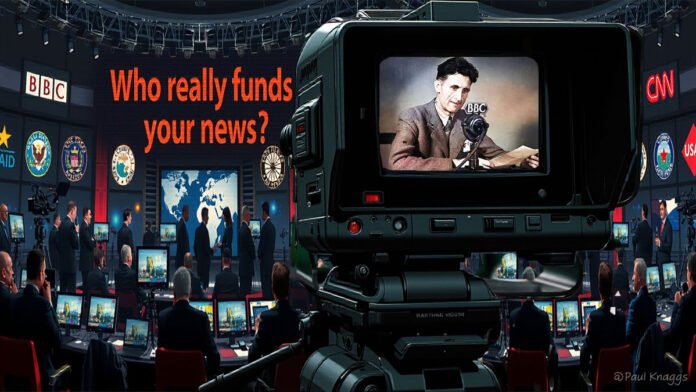Manufacturing Consent: The Global News Cartel Bought and Paid For.
A Legacy of Control…
“Freedom of the Press, if it means anything at all, means the freedom to criticise and oppose,” wrote George Orwell. Yet in 2025, we’re discovering that the threat to press freedom isn’t just from corporate moguls – it’s from state actors masquerading as champions of free media.
The roots of this control run deep. Operation Mockingbird, the CIA’s Cold War programme to manipulate domestic American news media, wasn’t just a historical anomaly – it was a blueprint. When the 1975 Church Committee exposed the Agency’s extensive connections with journalists and civic groups, it revealed just the tip of an iceberg that has since grown to encompass global media manipulation.
Today’s landscape eerily mirrors what Noam Chomsky and Edward Herman described in their propaganda model: a system where money and power filter the news, marginalise dissent, and allow dominant interests to control public discourse. Their five filters – ownership concentration, advertising dependence, reliance on official sources, flak against dissent, and ideology as control – are more relevant than ever.
While the left has long focused on Rupert Murdoch’s News Corp as the bogeyman of media manipulation, we’ve overlooked an equally powerful force: the United States’ quiet colonisation of global media. When USAID funds 6,200 journalists and 707 media outlets across 30 countries, spending £268.4 million on “independent media,” we must ask: Is this supporting press freedom, or creating the world’s largest propaganda network?
The synchronicity of narrative across supposedly independent outlets becomes less mysterious when you follow the money. USAid, the world’s largest single aid donor, distributed £72 billion in 2023 alone. Among its beneficiaries is the BBC’s international charity, BBC Media Action, which received £2.6 million in 2023-24 – second only to the Foreign Office’s £3 million contribution.
The BBC and Beyond: How State Actors Manipulate Public Perception
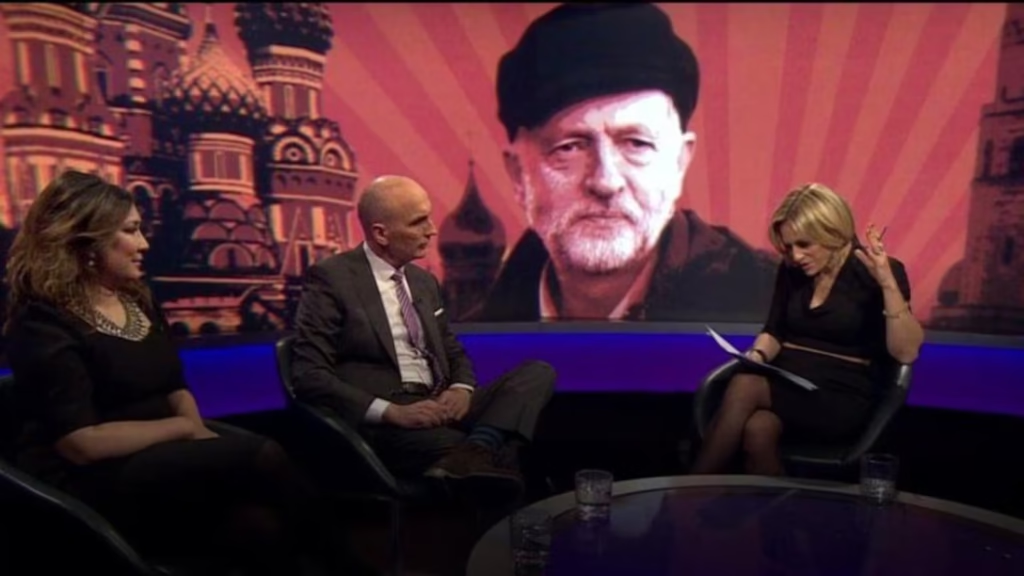
A report found that 75% of press coverage misrepresents Jeremy Corbyn – we can’t ignore media bias
We have seen how “The Fourth Estate” has been used as a tool to ensure the continuation of the status quo, none more so than by the methods used in their character assassination of Jeremy Corbyn.
No matter which political tribe you belong to it cannot be denied the bias, manipulations and lies conducted against Corbyn were unprecedented, of course, the oligarchy was frightened he would take their power and wealth and give it to the people! However true or false that statement may be, they were not prepared to see what would happen if he became Prime Minister, they used every weapon at their disposal to stop any social change.
Analysis shows that Corbyn was thoroughly delegitimised as a political actor from the moment he became a prominent candidate and even more so after he was elected as party leader, with a strong mandate. This process of delegitimisation occurred in several ways: 1) through lack of or distortion of voice; 2) through ridicule, scorn and personal attacks; and 3) through association, true or false, mainly with terrorism.
All this raises, in our view, a number of pressing ethical questions regarding the role of the media in a democracy. Certainly, democracies need their media to challenge power and offer robust debate, but when this transgresses into an antagonism that undermines legitimate political voices that dare to contest the current status quo, then it is not democracy that is served.
Let’s take a closer look at the BBC, that venerable institution long presented as the gold standard of public broadcasting. Its history reveals a darker pattern of institutional manipulation that extends well beyond its role in British imperialism. From its participation in the 1953 CIA/MI6 coup in Iran to modern-day controversies, the BBC’s record speaks volumes about the gap between public service ideals and institutional practice.
The infamous Martin Bashir interview with Princess Diana in 1995 captures the deceit very well. An official inquiry found that Bashir acted “deceitfully,” faking documents to secure the interview, while the BBC’s own 1996 internal investigation was deemed “woefully ineffective.” The corporation’s subsequent apologies to Princes William and Harry, Prince Charles, and Earl Spencer – along with the returning of awards including a BAFTA – came far too late to undo the damage. This wasn’t merely a journalistic scandal; it was a betrayal of public trust that exposed the institution’s willingness to prioritise sensationalism over integrity.
This pattern of manipulation has deep historical roots. As The Guardian revealed, the BBC’s wartime European broadcast director, Noel Francis Newsome, explicitly strategised to use news as a weapon, creating what he called “recognisably British” propaganda. So effective was this approach that even Hitler’s propaganda chief Goebbels acknowledged British expertise in weaponising news. While the BBC maintains a catalogue of corrections, these are often buried away from public view – the damage done by the original broadcasts rarely undone by hidden apologies.
Today, with USAID as its second-largest donor through BBC Media Action (£2.6 million in 2023-24), the corporation’s independence faces fresh questions. This financial relationship with foreign state actors adds another layer to the BBC’s complex role as both public broadcaster and instrument of state influence. When corrections are relegated to footnotes while misleading broadcasts reach millions, we must ask whether the institution’s commitment to truth can withstand the pressures of both state funding and institutional self-preservation.
Media Monopoly: The Dangerous Concentration of News Ownership
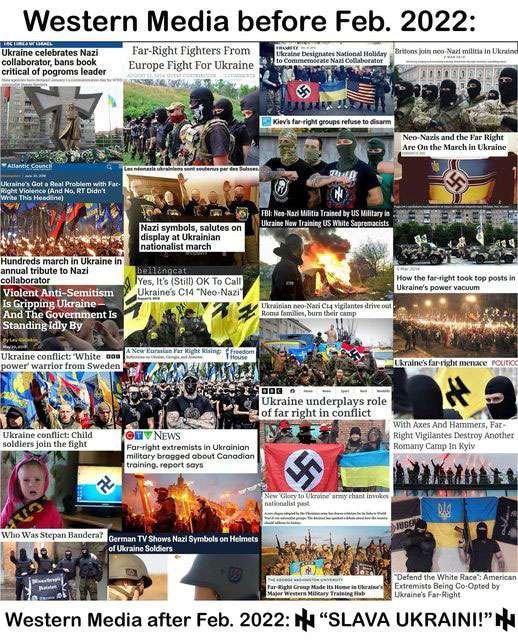
The Manufacturing of War Consensus
In our hyper-connected world, the machinery of media has perfected the art of manufacturing consent for conflict. News organisations, rather than illuminating the complexity of international relations, often reduce multifaceted geopolitical crises to simplified narratives that play into existing prejudices and political divisions. This process, amplified across traditional and social media platforms, effectively restricts the boundaries of acceptable debate while giving the illusion of comprehensive coverage.
Consider the media’s handling of the Russia-Ukraine conflict. Western media outlets, owned by the same conglomerates we’ve discussed, present a narrative stripped of historical context and nuance. As Noam Chomsky observed, “The smart way to keep people passive and obedient is to strictly limit the spectrum of acceptable opinion, but allow very lively debate within that spectrum.” This principle is evident in how mainstream media frames international conflicts – permitting passionate debate within carefully constructed parameters while excluding broader questions about the nature of the conflict itself.
The power of these narrative structures lies in their ability to reshape public perception. Prior to February 2022, Western media regularly reported on Ukraine’s domestic challenges, including systemic corruption and political instability. Yet almost overnight, these complexities vanished from mainstream discourse, replaced by a simplified narrative that better served geopolitical interests. The Minsk agreements, regional tensions, and the intricate tapestry of Eastern European politics – all documented extensively in pre-2022 reporting – faded from public discussion.
This pattern of selective memory in media coverage isn’t unique to any one conflict or crisis. Rather, it exemplifies how concentrated media ownership and coordinated narrative control can effectively rewrite recent history, demonstrating precisely why diverse, independent media voices are essential for maintaining a fully informed public discourse.
Meanwhile, in the UK, media ownership has reached dangerous levels of concentration. Three companies – DMG Media, News UK, and Reach – control 90% of the national newspaper market. Should DMG Media acquire Telegraph Media Group, their print market share would approach 50%. This isn’t press diversity; it’s an information cartel.
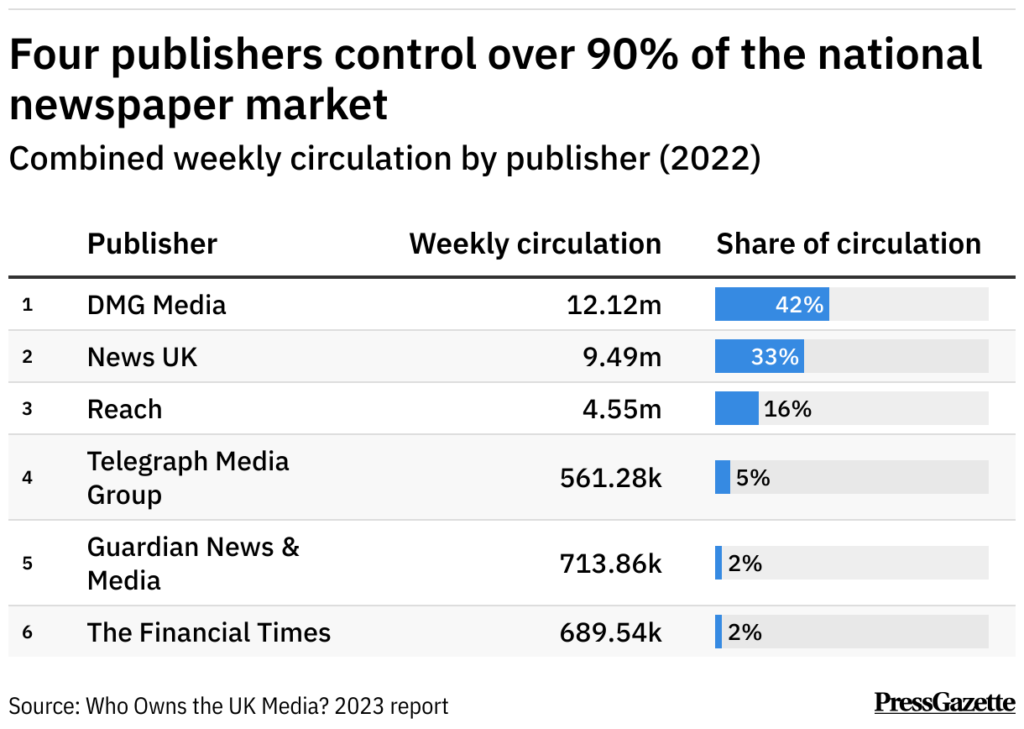

This isn’t just about ownership statistics or funding sources – it’s about power. When three companies control 90% of national newspapers, they don’t just own media outlets; they own the ability to shape public perception, influence political debate, and ultimately, control the narrative of our times. As Orwell understood, controlling the present means controlling how we understand both past and future.
The defenders of state funding argue that maintaining quality journalism requires money. But there’s a world of difference between public funding with democratic oversight and allowing a foreign power to bankroll your nation’s media. When the US government funds thousands of journalists worldwide, it’s not supporting press freedom – it’s building a global echo chamber for American interests.
Government and traditional media’s hostility toward independent outlets becomes more understandable in this context. Small, reader-funded platforms represent a threat not just to their business model, but to the entire apparatus of information control.
This isn’t just about media diversity – it’s about national sovereignty and democratic integrity. How can the people make informed decisions when their information comes from sources compromised by foreign influence and corporate consolidation? The decline in newspaper circulation – down 6% between 2020 and 2022 – suggests readers are increasingly sceptical of this controlled narrative.
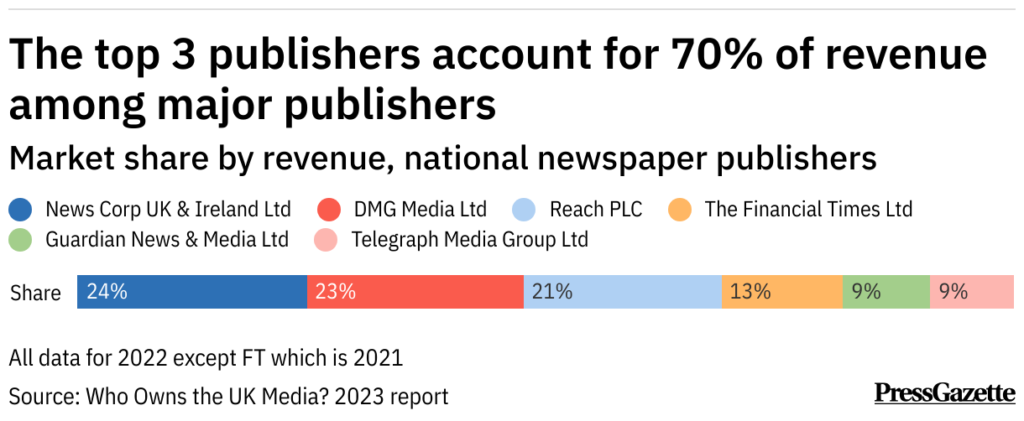
The rise of alternative media platforms represents more than just hope – it’s a grassroots revolution in information sharing. Yet these platforms face a David versus Goliath battle against entrenched interests and limited resources. Publications like Labour Heartlands exemplify this struggle, operating on reader donations and principled independence while competing against media empires backed by corporate wealth and state funding. They may not always get it right – no media outlet does – but their commitment to independent journalism and tireless effort to uncover truth offers something increasingly rare in modern media: authentic voices free from corporate or state control.
This independent spirit matters precisely because it’s imperfect. Unlike the polished narratives of mainstream media, alternative outlets acknowledge their limitations while striving for truth. They work without the safety net of corporate backing or state funding, answering only to their readers and their conscience. This transparency about their own fallibility – combined with their determination to keep pushing forward – represents exactly the kind of honest journalism our democracy needs.
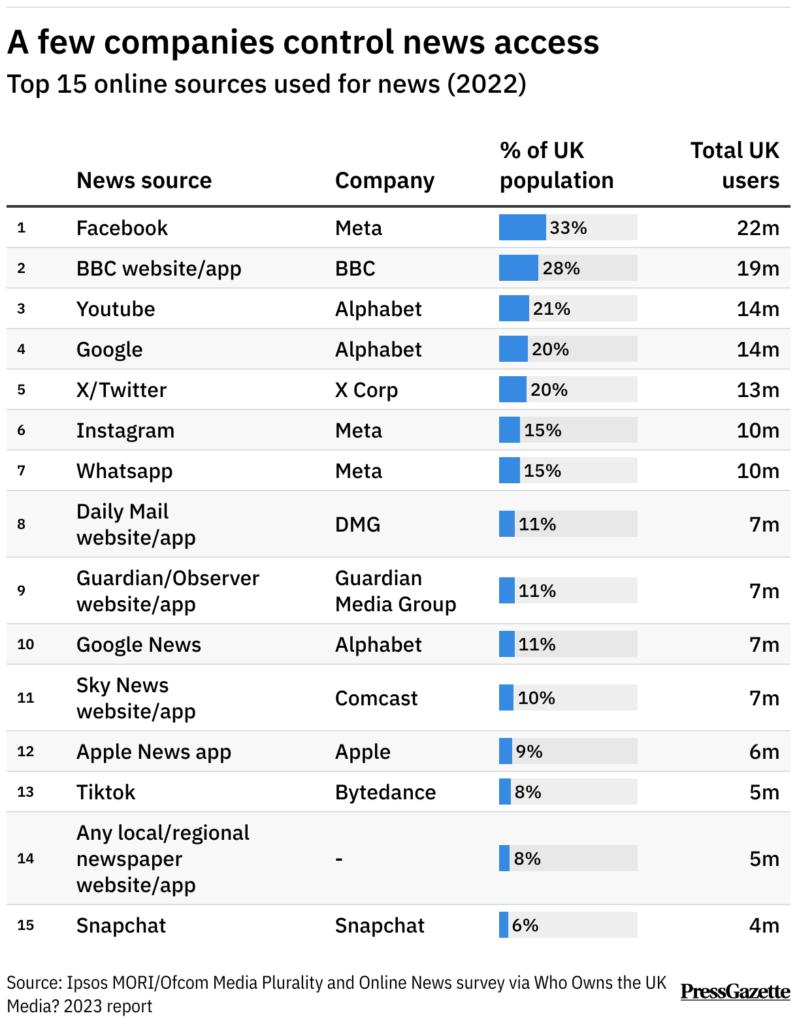
The solution begins with recognition and resistance. We need robust media ownership laws, complete transparency about funding sources, and active support for truly independent journalism. Most crucially, we need to understand that press freedom isn’t given, nor should it be bought and paid for – it must be continually fought for and defended.
Until then, Orwell’s words about press freedom serve not just as commentary but as a measure against which we must judge our media landscape. If the freedom to criticise and oppose is the true test of press freedom, then our current system of concentrated ownership and covert influence fails spectacularly. The question isn’t just “Who owns the news?” but “Who owns the right to criticise?”
Support Independent Journalism Today
Our unwavering dedication is to provide you with unbiased news, diverse perspectives, and insightful opinions. We're on a mission to ensure that those in positions of power are held accountable for their actions, but we can't do it alone. Labour Heartlands is primarily funded by me, Paul Knaggs, and by the generous contributions of readers like you. Your donations keep us going and help us uphold the principles of independent journalism. Join us in our quest for truth, transparency, and accountability – donate today and be a part of our mission!
Like everyone else, we're facing challenges, and we need your help to stay online and continue providing crucial journalism. Every contribution, no matter how small, goes a long way in helping us thrive. By becoming one of our donors, you become a vital part of our mission to uncover the truth and uphold the values of democracy.
While we maintain our independence from political affiliations, we stand united against corruption, injustice, and the erosion of free speech, truth, and democracy. We believe in the power of accurate information in a democracy, and we consider facts non-negotiable.
Your support, no matter the amount, can make a significant impact. Together, we can make a difference and continue our journey toward a more informed and just society.
Thank you for supporting Labour Heartlands
